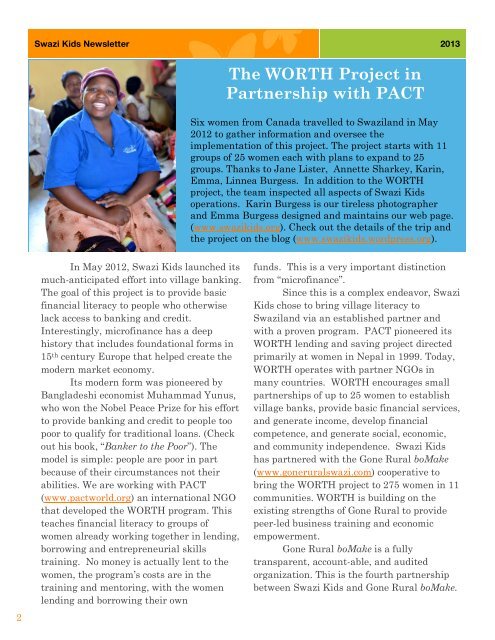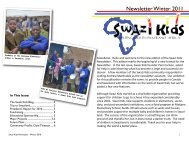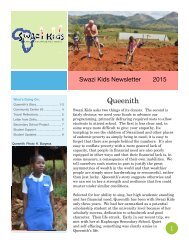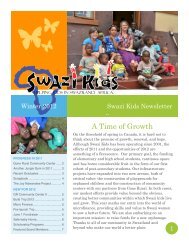2013 Swazi Kids Newsletter
Create successful ePaper yourself
Turn your PDF publications into a flip-book with our unique Google optimized e-Paper software.
<strong>Swazi</strong> <strong>Kids</strong> <strong>Newsletter</strong> <strong>2013</strong><br />
The WORTH Project in<br />
Partnership with PACT<br />
Six women from Canada travelled to <strong>Swazi</strong>land in May<br />
2012 to gather information and oversee the<br />
implementation of this project. The project starts with 11<br />
groups of 25 women each with plans to expand to 25<br />
groups. Thanks to Jane Lister, Annette Sharkey, Karin,<br />
Emma, Linnea Burgess. In addition to the WORTH<br />
project, the team inspected all aspects of <strong>Swazi</strong> <strong>Kids</strong><br />
operations. Karin Burgess is our tireless photographer<br />
and Emma Burgess designed and maintains our web page.<br />
(www.swazikids.org). Check out the details of the trip and<br />
the project on the blog (www.swazikids.wordpress.org).<br />
2<br />
In May 2012, <strong>Swazi</strong> <strong>Kids</strong> launched its<br />
much-anticipated effort into village banking.<br />
The goal of this project is to provide basic<br />
financial literacy to people who otherwise<br />
lack access to banking and credit.<br />
Interestingly, microfinance has a deep<br />
history that includes foundational forms in<br />
15 th century Europe that helped create the<br />
modern market economy.<br />
Its modern form was pioneered by<br />
Bangladeshi economist Muhammad Yunus,<br />
who won the Nobel Peace Prize for his effort<br />
to provide banking and credit to people too<br />
poor to qualify for traditional loans. (Check<br />
out his book, “Banker to the Poor”). The<br />
model is simple: people are poor in part<br />
because of their circumstances not their<br />
abilities. We are working with PACT<br />
(www.pactworld.org) an international NGO<br />
that developed the WORTH program. This<br />
teaches financial literacy to groups of<br />
women already working together in lending,<br />
borrowing and entrepreneurial skills<br />
training. No money is actually lent to the<br />
women, the program’s costs are in the<br />
training and mentoring, with the women<br />
lending and borrowing their own<br />
funds. This is a very important distinction<br />
from “microfinance”.<br />
Since this is a complex endeavor, <strong>Swazi</strong><br />
<strong>Kids</strong> chose to bring village literacy to<br />
<strong>Swazi</strong>land via an established partner and<br />
with a proven program. PACT pioneered its<br />
WORTH lending and saving project directed<br />
primarily at women in Nepal in 1999. Today,<br />
WORTH operates with partner NGOs in<br />
many countries. WORTH encourages small<br />
partnerships of up to 25 women to establish<br />
village banks, provide basic financial services,<br />
and generate income, develop financial<br />
competence, and generate social, economic,<br />
and community independence. <strong>Swazi</strong> <strong>Kids</strong><br />
has partnered with the Gone Rural boMake<br />
(www.goneruralswazi.com) cooperative to<br />
bring the WORTH project to 275 women in 11<br />
communities. WORTH is building on the<br />
existing strengths of Gone Rural to provide<br />
peer-led business training and economic<br />
empowerment.<br />
Gone Rural boMake is a fully<br />
transparent, account-able, and audited<br />
organization. This is the fourth partnership<br />
between <strong>Swazi</strong> <strong>Kids</strong> and Gone Rural boMake.






